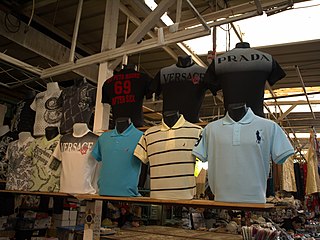
Advertising is a marketing communication that employs an openly sponsored, non-personal message to promote or sell a product, service or idea. Sponsors of advertising are typically businesses wishing to promote their products or services. Advertising is differentiated from public relations in that an advertiser pays for and has control over the message. It differs from personal selling in that the message is non-personal, i.e., not directed to a particular individual. Advertising is communicated through various mass media, including traditional media such as newspapers, magazines, television, radio, outdoor advertising or direct mail; and new media such as search results, blogs, social media, websites or text messages. The actual presentation of the message in a medium is referred to as an advertisement.

International trade is the exchange of capital, goods, and services across international borders or territories because there is a need or want of goods or services.

Fair trade is an arrangement designed to help producers in growing countries achieve sustainable and equitable trade relationships. Members of the fair trade movement add the payment of higher prices to exporters, as well as improved social and environmental standards. The movement focuses in particular on commodities, or products that are typically exported from developing countries to developed countries, but is also used in domestic markets, most notably for handicrafts, coffee, cocoa, wine, sugar, fruit, flowers, and gold.

Consumerism is a social and economic order that encourages the acquisition of goods and services in ever-increasing amounts. With the industrial revolution, but particularly in the 20th century, mass production led to overproduction—the supply of goods would grow beyond consumer demand, and so manufacturers turned to planned obsolescence and advertising to manipulate consumer spending. In 1899, a book on consumerism published by Thorstein Veblen, called The Theory of the Leisure Class, examined the widespread values and economic institutions emerging along with the widespread "leisure time" in the beginning of the 20th century. In it, Veblen "views the activities and spending habits of this leisure class in terms of conspicuous and vicarious consumption and waste. Both are related to the display of status and not to functionality or usefulness."

A boy is a young male human. The term is commonly used for a child or an adolescent. When a male human reaches adulthood, he is described as a man.

To counterfeit means to imitate something authentic, with the intent to steal, destroy, or replace the original, for use in illegal transactions, or otherwise to deceive individuals into believing that the fake is of equal or greater value than the real thing. Counterfeit products are fakes or unauthorized replicas of the real product. Counterfeit products are often produced with the intent to take advantage of the superior value of the imitated product. The word counterfeit frequently describes both the forgeries of currency and documents as well as the imitations of items such as clothing, handbags, shoes, pharmaceuticals, automobile parts, unapproved aircraft parts, watches, electronics and electronic parts, software, works of art, toys, and movies.

Corporate social responsibility (CSR) is a form of international private business self-regulation which aims to contribute to societal goals of a philanthropic, activist, or charitable nature by engaging in or supporting volunteering or ethically-oriented practices. While once it was possible to describe CSR as an internal organisational policy or a corporate ethic strategy, that time has passed as various national and international laws have been developed and various organisations have used their authority to push it beyond individual or even industry-wide initiatives. While it has been considered a form of corporate self-regulation for some time, over the last decade or so it has moved considerably from voluntary decisions at the level of individual organizations to mandatory schemes at regional, national, and international levels.
Glocalization is the "simultaneous occurrence of both universalizing and particularizing tendencies in contemporary social, political, and economic systems." The notion of glocalization "represents a challenge to simplistic conceptions of globalization processes as linear expansions of territorial scales. Glocalization indicates that the growing importance of continental and global levels is occurring together with the increasing salience of local and regional levels."
J.D. Power is an American data analytics and consumer intelligence company founded in 1968 by James David Power III. The company, headquartered in Troy, Michigan, describes itself as "a global data & analytics company." It conducts surveys of customer satisfaction, product quality, and buyer behavior for the automotive, banking & payments, wealth & lending, telecommunications, insurance, health, travel and utilities sectors. The firm is best known for its customer satisfaction research and benchmarking on new-car quality and long-term dependability. Its service offerings include industry-wide syndicated studies, proprietary research, consulting, training, and automotive forecasting.

Food miles is the distance food is transported from the time of its making until it reaches the consumer. Food miles are one factor used when testing the environmental impact of food, such as the carbon footprint of the food.
Chargeback fraud, also known as friendly fraud, occurs when a consumer makes an online shopping purchase with their own credit card, and then requests a chargeback from the issuing bank after receiving the purchased goods or services. Once approved, the chargeback cancels the financial transaction, and the consumer receives a refund of the money they spent. Dependent on the payment method used, the merchant can be accountable when a chargeback occurs.
CareerBuilder is an employment website founded in 1995 and with offices in the United States, Canada, Europe, and Asia. In 2008, it had the largest market share among online employment websites in the United States, where it was founded. CareerBuilder.com provides labor market information, talent management software, and other recruitment related services. The company is owned by investment firm Apollo Global Management.
Beryl T. "Sue" Atkins was a British lexicographer, specialising in computational lexicography, who pioneered the creation of bilingual dictionaries from corpus data.
Global village describes the phenomenon of the entire world becoming more interconnected as the result of the propagation of media technologies throughout the world. The term was coined by Canadian media theorist Marshall McLuhan in his books The Gutenberg Galaxy: The Making of Typographic Man (1962) and Understanding Media (1964). Literary scholar Sue-Im Lee describes how the term global village has come to designate “the dominant term for expressing a global coexistence altered by transnational commerce, migration, and culture”. Economic journalist Thomas Friedman's definition of the global village as a world “tied together into a single globalized marketplace and village” is another contemporary understanding of the term.
In mass communication, media are the communication outlets or tools used to store and deliver information or data. The term refers to components of the mass media communications industry, such as print media, publishing, the news media, photography, cinema, broadcasting, digital media, and advertising.

Cengage Group is an American educational content, technology, and services company for the higher education, K-12, professional, and library markets. It operates in more than 20 countries around the world.
Culture jamming is a protest used by many anti-consumerist social movements to disrupt or subvert media culture and its mainstream cultural institutions, including corporate advertising. It attempts to "expose the methods of domination" of a mass society.
Cultural studies is an interdisciplinary field that examines the political dynamics of contemporary culture and its historical foundations. Cultural studies researchers generally investigate how cultural practices relate to wider systems of power associated with, or operating through, social phenomena. These include ideology, class structures, national formations, ethnicity, sexual orientation, gender, and generation. Employing cultural analysis, cultural studies views cultures not as fixed, bounded, stable, and discrete entities, but rather as constantly interacting and changing sets of practices and processes. The field of cultural studies encompasses a range of theoretical and methodological perspectives and practices. Although distinct from the discipline of cultural anthropology and the interdisciplinary field of ethnic studies, cultural studies draws upon and has contributed to each of these fields.
Matthew J. Hilton, FRHistS, is an academic social historian. Since 2016, he has been Vice-Principal for Humanities and Social Sciences at Queen Mary University of London, where he holds a professorship.
The Immune Power Diet is a pseudoscientific elimination diet promoted by physician Stuart M. Berger (1953-1993). The diet was based on the false idea that many people have hidden food allergies and that by eliminating certain foods and taking dietary supplements the body's immune system would be strengthened.









